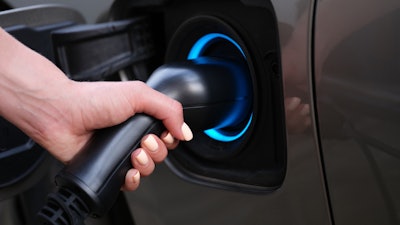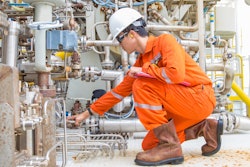
LANSING, Mich. (AP) — A Michigan economic development board approved more than $400 million in state incentives Wednesday for two battery factories estimated to cost $4 billion and bring 4,500 jobs to the state.
Pending approval by state lawmakers, the incentive packages would draw from a fund created less than a year ago to help the automotive state land major business expansions in the wake of news that Dearborn-based Ford Motor Co. would begin building electric vehicle battery plants in other states.
"We are in global competition to make sure that Michigan stays on the cutting edge of auto manufacturing. Investments like the ones that we've announced today are game changers," Michigan Gov. Gretchen Whitmer said Wednesday in an interview with The Associated Press.
A Michigan energy-storage company, Our Next Energy, would be allocated $236 million in the agreement for an up to $1.6 billion project in Van Buren Township outside of Detroit. An allocation of $175 million in incentives will go to a $2.4 billion factory planned by Chinese manufacturer Gotion for Big Rapids in northern Michigan. The factories would produce components used for electric vehicle batteries.
President Joe Biden showcased his administration's efforts to promote electric vehicles during an appearance at the Detroit auto show last month when he said Michigan is "building the future of the electric vehicle."
Under his Inflation Reduction Act, the batteries must be built in North America for electric vehicles to be eligible for a federal tax credit of up to $7,500.
The Michigan Economic Development Corporation board passed the incentives Wednesday but legislative approval will need to come through the House and Senate appropriations committees. A timeline for the committees' approval is unknown, according to a spokesman.
The $2.4 billion Gotion project, which is planned on a 523-acre site in Big Rapids, would create 2,350 jobs with average wages of $29.42 per hour, according to the company's proposal. The factory will produce cathodes and anodes, two components that are key to electric vehicle batteries. The board also approved a 30-year Renaissance Zone that was approved last week by county officials and will save the company an estimated $540 million.
Our Next Energy says it's 59,000-square-foot (18,000-square-meter) factory planned in Van Buren Township will cost $1.6 billion and create 2,112 new jobs making "battery packs for commercial and consumer Electric Vehicles."
Quentin L. Messer Jr., CEO of the state economic development corporation, said the $400 million in incentives are performance-based, in case targets aren't met.
"If the company performs but then subsequently has nonperformance, and if that nonperformance isn't subsequently remedied, then those state tax dollars will be returned back to the taxpayers of Michigan," Messer said during an interview with the AP.
The Strategic Outreach and Attraction Reserve fund was passed by the Republican-controlled Legislature last year with a $1.5 billion budget.
To date, $794 million in incentives have been used from the SOAR funds, including a $666 million allocation in March for General Motor projects and another $101 million in July for Ford projects. Lawmakers approved an additional $846 million last week to replenish the fund.
"Michigan has to compete for the jobs of tomorrow and the only way to do that is to be in the game," Curtis Hertel, the top Democrat on the Senate Appropriations Committee, told the AP last week.






















